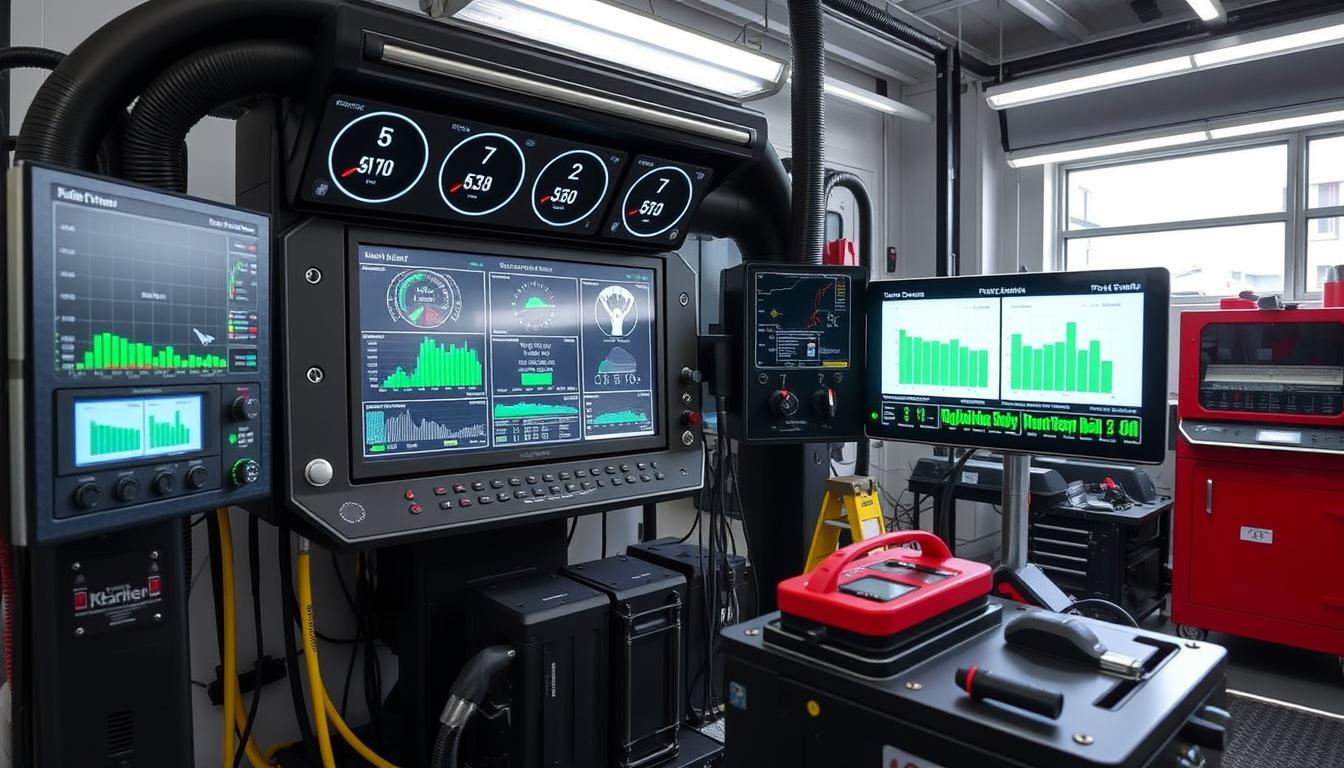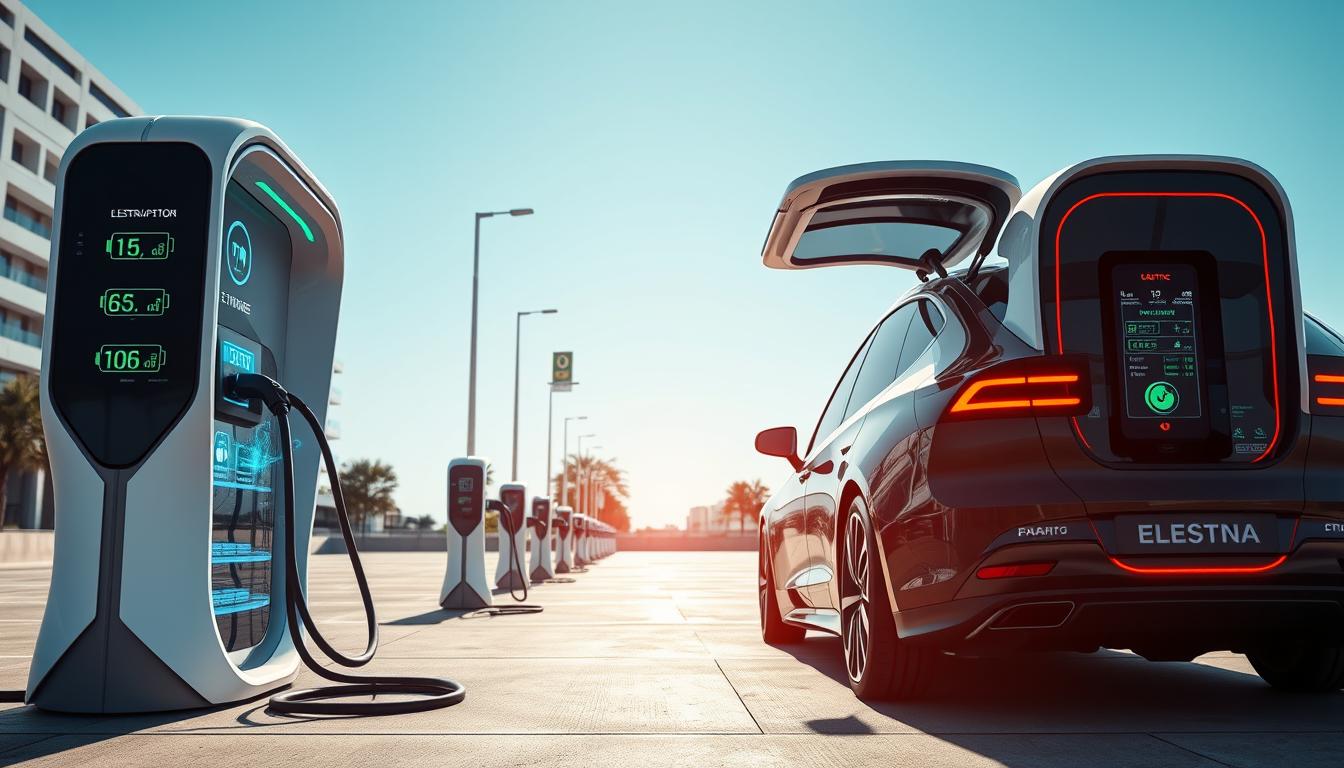Testing Electric Car Battery Health: Quick Guide
In the fast-changing world of electric vehicles (EVs), the battery’s health is key. It affects how well your car drives and how long it lasts. As an EV owner, knowing your battery system is crucial. But, have you ever thought, “How can I accurately test my electric car’s battery?”
This guide will show you how to check your electric car’s battery health. We’ll cover the basics of battery tech and how to do deep diagnostics. You’ll learn how to keep your EV’s battery running well and lasting long.
Understanding Electric Vehicle Battery Technology
When we talk about testing electric car battery health, we must first understand the electric vehicle battery technology. At the center of an electric car is the lithium-ion battery chemistry. This chemistry is what makes the car run and how far it can go.
Lithium-Ion Battery Chemistry and Composition
Lithium-ion batteries are key in today’s electric cars. They pack a lot of energy, last a long time, and charge quickly. A lithium-ion battery has a graphite anode, a lithium-based cathode, and an electrolyte solution. This solution helps ions move between the electrodes.
The magic happens when lithium ions move between the anode and cathode. This movement is what powers electric cars. It makes them a great choice over cars with traditional engines.
Battery Management System: The Brain of EV Batteries
The battery management system (BMS) is crucial for electric vehicle battery technology. It’s like the brain that watches over the battery pack. It keeps an eye on voltage, current, temperature, and charge level.
The BMS makes sure the battery works well and lasts long. It stops the battery from getting too full or too empty. This helps the car use energy efficiently.
Knowing about lithium-ion batteries and the BMS is key to checking an electric car’s battery. This knowledge helps us keep the battery in top shape.
“The battery management system is the unsung hero of electric vehicle technology, ensuring the efficient and safe operation of the battery pack.”
Signs of a Failing Electric Car Battery
It’s important to know when your electric car battery is failing. This helps you take care of it early and avoid sudden problems. We’ll look at common signs that show your battery might be wearing out.
A big sign is when your car goes less far on a charge. As the battery gets older, it can’t hold a charge as well. This means you’ll need to charge it more often.
Another sign is if your car’s battery doesn’t last as long as it used to. If you find yourself charging it more or it drains faster, it might be failing.
- Reduced driving range
- Shorter battery charge duration
- Difficulty maintaining charge
- Increased charging time
- Unexpected battery-related issues
Also, watch out for any odd battery problems. If it suddenly drains or your car acts strangely, it could be a sign of trouble.
“Regularly monitoring your electric car’s battery health can help you stay ahead of potential issues and ensure your vehicle continues to perform at its best.”
By keeping an eye out for these signs, you can fix problems early. This keeps your electric car’s battery in good shape.
How to test the health of an electric car battery
Keeping your electric car’s battery in top shape is key for its best performance and longer life. We’ll look at two main ways to check your EV’s battery: battery capacity testing and state of charge (SoC) analysis.
Battery Capacity Testing
Battery capacity testing is the top method for checking an electric vehicle’s battery health. It measures how much energy the battery can store. This test shows us how the battery is doing and if it can power your car well.
- Fully charge the battery to 100% state of charge.
- Discharge the battery at a controlled rate until it reaches the minimum recommended level.
- Measure the total energy (in kWh) delivered during the discharge cycle.
- Compare the measured capacity to the manufacturer’s specifications to assess the battery’s health.
State of Charge (SoC) Analysis
Checking the state of charge (SoC) is also important for understanding your electric car’s battery health. SoC shows how full the battery is, as a percentage. Watching the SoC helps us see how our driving and charging habits affect the battery.
- Check the SoC display in your electric vehicle’s dashboard or infotainment system.
- Observe the SoC over several charging and driving cycles to identify any unusual fluctuations or rapid drops in charge level.
- Analyze the SoC data to understand your battery’s usage patterns and identify potential issues that may require further investigation.
By using both battery capacity testing and SoC analysis, you can really understand your electric car’s battery health. This knowledge helps you make smart choices about caring for your battery and when it might need to be replaced.
EV Battery Diagnostic Tools and Equipment
Checking an electric car’s battery health is key for its best performance and life. Luckily, many ev battery diagnostic tools and equipment are out there. They help owners and mechanics understand their battery’s condition.
On-Board Diagnostics and Scan Tools
The on-board diagnostics system is a must for electric vehicle care. It watches the battery all the time. It shows data like charge level, temperature, and how each cell is doing.
By using a battery scan tool with the OBD port, you get all this info. This lets you know how your battery is doing.
- On-board diagnostics: Integrated system that monitors battery status
- Battery scan tools: Devices that connect to the OBD port to access battery data
- Analyze state of charge, temperature, cell-level performance, and more
There’s also electric vehicle maintenance equipment made just for battery checks. These tools give deeper insights. They let you do full tests, check charge and discharge rates, and find any battery problems.
Using the right tools and equipment helps avoid battery issues. This way, your electric car’s battery will keep working great for a long time.
Battery Degradation and Aging Factors
Electric vehicles (EVs) are becoming more popular. It’s important to know what makes batteries wear out. We’ll look at environmental, usage, and charging factors that affect battery health. This will help you keep your battery in good shape for longer.
Temperature is a big factor in battery wear. Extreme heat or cold can harm your battery. Using a good battery management system (BMS) helps manage temperature.
The depth of discharge (DoD) also matters. Draining the battery too low can cause it to degrade faster. Try to keep the charge between 20% and 80% for better battery life.
| Battery Aging Factors | Impact on EV Battery Lifespan |
|---|---|
| Temperature Extremes | Accelerated degradation and reduced capacity |
| Depth of Discharge (DoD) | Frequent deep discharges leading to faster aging |
| Charging Patterns | Rapid charging and overcharging can harm battery health |
| Battery Usage | High-performance driving and heavy loads contribute to degradation |
How you charge your EV is also important. Rapid charging and overcharging can stress the battery. Slow overnight charging is better for your battery’s health.
Driving habits also affect battery life. Avoiding high-performance driving and heavy loads helps. A balanced driving style is best.
Knowing what affects battery degradation helps you take care of your EV’s battery. This way, you can enjoy a reliable and cost-effective ride for many years.
Maximizing Electric Car Battery Lifespan
Keeping your electric car’s battery healthy is key. It helps your car run well and saves money on new batteries. Use the right charging ways and manage the temperature to make your battery last longer.
Proper Charging Techniques
Charging your electric car right is very important. Here are some tips:
- Avoid frequent full discharges – Try to keep the battery charge level between 20% and 80% whenever possible.
- Limit fast charging – Frequent use of high-powered DC fast charging can accelerate battery degradation. Use this option sparingly.
- Schedule regular overnight charging – Slow, overnight charging at a standard 120V or 240V outlet is gentler on the battery.
- Monitor charging temperatures – Extreme temperatures, both hot and cold, can negatively impact battery performance and lifespan.
Temperature Management for EV Batteries
Keeping your electric car’s battery away from extreme temperatures is key. Here’s how to manage the temperature:
- Park in shade or a garage when possible to avoid direct sunlight and high ambient temperatures.
- Utilize the EV’s climate control system to maintain the battery at optimal operating temperatures during charging and driving.
- Avoid leaving your EV parked for extended periods in very hot or very cold environments.
- Consider installing a battery thermal management system if your vehicle doesn’t have one.
By following these tips, you can make your electric car’s battery last longer. This means your car will run well for years.
Professional EV Battery Testing and Maintenance
Getting your electric vehicle’s battery checked by experts is key. They know how to test and maintain your battery well. This helps keep it running smoothly for a long time.
These pros use special tools to check your battery’s health. They look for any problems and suggest how to keep it in top shape. This way, your battery lasts longer and works better.
| Professional EV Battery Testing | Key Benefits |
|---|---|
| Detailed Capacity Testing | Accurately measure the battery’s remaining charge capacity and identify any degradation |
| State of Charge (SoC) Analysis | Evaluate the battery’s current charge level and monitor its performance over time |
| Thermal Management Checkup | Ensure the battery’s temperature regulation system is functioning properly |
| Battery Management System (BMS) Diagnostics | Assess the battery’s control and monitoring systems for optimal performance |
Using these services, you learn a lot about your battery’s health. You can spot problems early and fix them. This makes your EV run better for many years.
“Regular professional assessment and maintenance of your electric vehicle’s battery is crucial for maximizing its performance and longevity.”
DIY vs. Professional Battery Health Assessment
Testing your electric car’s battery health has two options: DIY or professional services. Knowing the good and bad of each can help you choose wisely. This depends on what you need and like.
Pros and Cons of DIY EV Battery Health Assessment
Doing it yourself can save money and let you get hands-on. It helps you watch your battery closely and spot problems early. But, it needs tech skills and special tools, which might be hard for some.
- Cost-effective solution for budget-conscious car owners
- Gives you a sense of control and understanding of your battery’s condition
- Requires technical knowledge and access to specialized tools
- Potential for inaccurate or incomplete battery health assessment if not done properly
Pros and Cons of Professional EV Battery Health Assessment
Professional services offer a detailed and accurate check of your battery. Experts use the right tools and know-how to find and fix problems. It’s pricier, but it gives you confidence and keeps your battery in top shape.
- Comprehensive and accurate battery health assessment
- Carried out by trained professionals with specialized equipment
- Can provide detailed insights and recommendations for battery maintenance
- Typically more expensive than a DIY approach
- Requires scheduling an appointment and potentially waiting for service
Choosing between DIY or professional depends on your skills, budget, and how sure you want to be. Think about the good and bad of each to pick the best for your electric car and driving.
“Proper battery maintenance is crucial for maximizing the lifespan and performance of your electric vehicle.”
Electric Vehicle Battery Replacement Considerations
If your electric car’s battery is showing signs of wear or can’t meet your needs, it might need to be replaced. We’ll look at important things to think about when replacing your battery. This includes battery size, if it fits, cost, and ways to make your EV better.
When looking at ev battery replacement, the battery’s size is key. You want a new battery that gives you the same or better range. This might mean getting a bigger battery, which can let you drive further on one charge.
It’s also important to check if the new battery fits your EV. The battery must match your car’s make, model, and year for it to work right. Talking to your car’s maker or a trusted EV service can help find the right battery upgrade options for you.
The price of electric car battery replacement can change a lot. It depends on the battery’s size, tech, and how hard it is to install. Looking around for prices can help you find a good deal. Some car makers or other companies might also offer deals or warranties to help with the cost.
FAQ
How can I test the health of my electric car’s battery?
To check your electric car’s battery health, try a few things. You can test its capacity, check the state of charge, and use on-board diagnostics. These steps give you important info about your battery’s condition.
What are the common signs of a failing electric car battery?
Watch out for signs like a shorter driving range and longer charging times. Also, look for battery capacity loss and unexpected draining. Spotting these signs early can help fix issues before they get worse.
How can I maximize the lifespan of my electric car’s battery?
To keep your battery in top shape, charge it right. Avoid quick charges and keep it at the right temperature. Also, follow the maker’s maintenance tips and get professional checks to keep it going strong.
What factors contribute to electric car battery degradation?
High temperatures, fast charging, and using the battery too much can harm it. Knowing these factors helps you take steps to slow down battery wear.
When should I consider replacing my electric car’s battery?
Think about replacing the battery if its capacity drops a lot. This means less range and less power. Age, mileage, and how you use it also matter.
What are the benefits of seeking professional services for electric car battery testing?
Getting a pro to check your battery has many perks. They use advanced tools, give detailed reports, and offer custom advice. They can spot problems and suggest when to replace or upgrade.
What are the key differences between DIY and professional electric car battery health assessments?
DIY checks are basic, while pros do deep dives. Pros use special tools and know a lot more. They give detailed advice to keep your battery running well.



